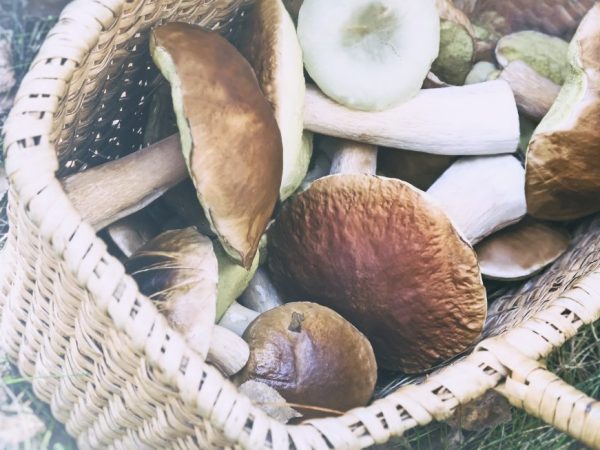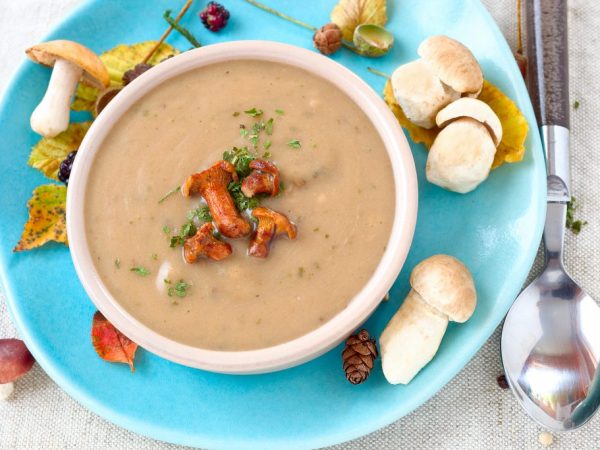Eating mushrooms during pregnancy
Mushrooms are rich in carbohydrates, proteins, they include B vitamins, vitamins A, D, E, a large amount of macro- and microelements. The product is healthy, but it is considered heavy for the stomach. Mushrooms during pregnancy are indicated for consumption, but you need to clearly know which of their representatives are harmless, and follow the cooking rules exactly.

Eating mushrooms during pregnancy
List of prohibited species
Wild mushrooms are taken with great care during pregnancy. If the place of collection was chosen incorrectly, poisonous representatives got into the basket, the rules for preparing mushrooms were not followed, food will harm both mother and child. There are several types that are prohibited for pregnant women:
- Raw: they are dangerous to the body, possess carcinogenic properties due to the possible accumulation of compounds from the environment that are hazardous to human health in the bodies.
- Pickled: they lose their beneficial qualities during cooking and, if production processes are disrupted, can become a source of botulism.
- Bought in spontaneous markets: it is impossible to determine where and how they are collected. And if the merchant offers mainly hats, then it's worth considering at all.
- Poisonous species: the formation of toxins is inherent in them by nature itself.
- Conditionally edible: in some of them, toxins are neutralized only with prolonged cooking or stewing.
Self-collection involves following some rules:
- You can not collect fruit bodies that grow near roads, factories, factories, cattle burial grounds, burials and in areas of high radiation. Mushrooms accumulate all harmful substances.
- Do not rip off species unfamiliar to you.
- Old edible fruiting bodies accumulate toxins over time, they are also left in the forest.
- Do not take representatives of edible species growing near poisonous mushrooms. The spores of the inedible mushroom spread to the edible one, so it becomes a source of poisoning. It is also highly likely that the contacting hyphae of the mycelium also "exchange" various compounds, as a result of which toxins enter the body of the edible mushroom.
List of permitted mushrooms
During pregnancy, a woman's tastes change greatly. If she especially wants mushrooms, do not limit herself to their use. In this case, the advantage is given to fruits grown artificially: champignons, truffles, oyster mushrooms, honey agarics, porcini mushrooms, shiitake. They are sold in supermarkets. The main thing is to choose the right ones.
Pregnant women are allowed to consume such forest fruits:
- boletus;
- porcini mushrooms, which have many useful properties;
- chanterelles, they contain vitamins C and A, beta-carotene, copper, potassium, manganese;
- boletus and boletus boletus;
- mushrooms.
Product benefits
Mushrooms are a source of B vitamins. In addition to them, the product contains folic acid, which is essential for fetal growth without abnormalities in early pregnancy, which favors the development of tissues and organs.The composition of the product helps to relieve toxicosis and improve the well-being of the mother.
Irina Selyutina (Biologist):
The mushrooms contain:
- lecithins that support heart function. If we consider that during pregnancy an increased load is imposed on this organ, then the intake of this substance into the woman's body is simply necessary;
- beta glucans: they help to strengthen the immune system;
- antioxidants: destroy free radicals, etc. prevent the development of malignant neoplasms;
- dietary fiber and some enzymes: able to lower the level and remove "bad" cholesterol from the body.
Forest mushrooms increase resistance to disease, speed up the brain, and help fight stress or depression. Chanterelles remove accumulated radioactive substances from the body, shiitake have anti-cancer properties, champignons help with headaches during pregnancy.
The product is dietary and does not contain fats. It is close in its composition to meat, because saturated with amino acids. Zinc, potassium, copper, manganese, niacin, magnesium enrich the body. Ascorbic acid is involved in the formation of the baby's connective tissues.
Cooking methods

It is better to stew mushrooms
It is better for pregnant women to eat these products boiled and stewed: this way they retain their beneficial properties, but are better (easier) absorbed by the body. Heat treatment takes about an hour and neutralizes hazardous substances. Before cooking, each copy is examined, the old, dried and rotten ones are thrown away.
It is undesirable to eat pickled mushrooms, rolled up and dried during pregnancy. This is due to the fact that:
- vinegar causes discomfort and cramps in the abdomen, excess salts lead to swelling;
- dried mushrooms are difficult to digest, difficult for the stomach;
- pickled, although tasty, but lose their useful properties.
Making mushroom soup
Pregnant soup should contain healthy ingredients. It is better that it is not greasy and overly seasoned with a variety of spices. Most often, women prepare champignon soup. They are safe and readily available. It is good if homemade vegetables are added to the dish: they do not contain nitrates.
Ingredients:
- water - 1.5 l;
- champignons - 5-6 pcs;
- onion - 1 pc.;
- carrots - 1 pc.;
- potatoes (medium) - 3-4 pcs.;
- dill, parsley;
- vegetable oil - 1 tbsp. l.
- salt to taste.
Preparation:
- Mushrooms and vegetables are washed, peeled and cut.
- First, the onion is fried in vegetable oil until golden brown, then the carrots are added and sautéed.
- Chopped vegetables, mushrooms and frying are dipped into boiling water.
- Cook for an hour.
- Pre-chopped dill and parsley are salted and added.
The mushroom soup is ready.
Conclusion
Mushrooms for pregnant women are allowed with their careful selection, the absence of individual intolerance and contraindications. Even a diet meal sometimes causes bloating, stomach pains, and indigestion. You should not add fruiting bodies to the menu every day, mushrooms are eaten in moderation. It is better for pregnant women to consult with their doctor before introducing mushrooms into their diet.



